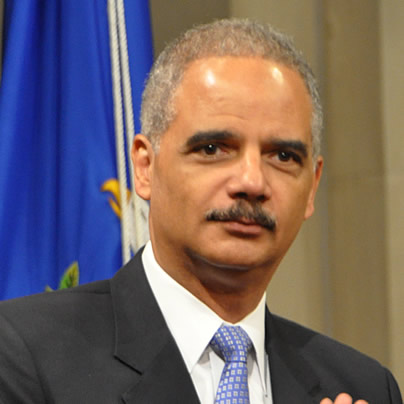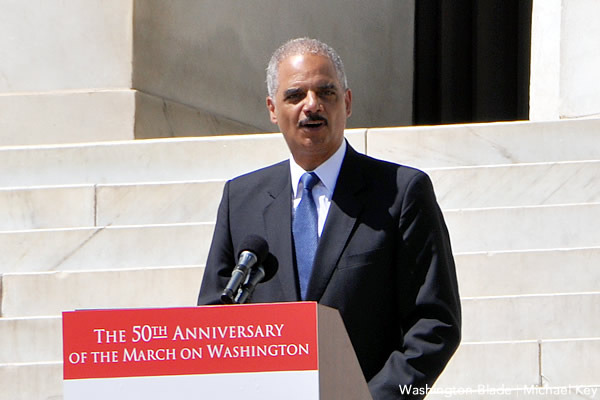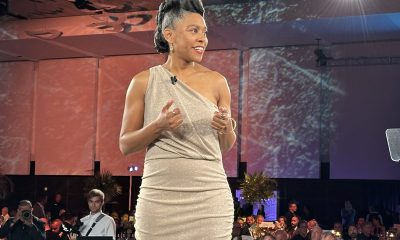News
Months after court ruling, DOMA issues remain unresolved
Social Security, veterans benefits and family leave not flowing in non-marriage equality states


U.S. Attorney General Eric Holder has pledged to extend federal benefits to married gay couples to the furthest extent possible under the law. (Washington Blade file photo by Michael Key)
Ever since the Supreme Court ruled against the Defense of Marriage Act last year, the Obama administration has been rolling out on a continual basis new federal benefits for married same-sex couples — but access to some benefits remains uncertain months after the decision.
While the administration has afforded a preponderance of the 1,138 federal benefits of marriage to same-sex couples, other benefits — including Social Security, veterans and family leave benefits — are still in limbo for those living in non-marriage equality states. For these benefits, federal policy looks to the place of residence, not the place of celebration, in determining whether a person is married.
The policy of the Obama administration has been to expand benefits to married same-sex couples to the furthest extend possible under the law following the court decision against DOMA. That position was formalized last week in a memo from U.S. Attorney General Eric Holder extending certain federal benefits under the purview of the Justice Department to married gay couples.
“It is the Department’s policy, to the extent federal law permits, to recognize lawful same-sex marriages as broadly as possible, and to recognize valid in the jurisdiction where the marriage was celebrated,” Holder writes.
Thus far, the administration has extended numerous benefits to married same-sex couples related to taxes, immigration, federal employee benefits, employer-provided pensions and, most recently, the ability to refuse to testify against a spouse in federal court — even if these couples live in non-marriage equality states. The Justice Department has also ceased enforcement of a provision in Title 38, which governs veterans benefits, that independently defines marriage in opposite-sex terms.
But things get dicier when it comes to other benefits where the law governing them looks to the state law where a couple resides, rather than the state law where the couple was married in determining whether a marriage is legitimate. Does the spirit of the Supreme Court ruling against DOMA mean that these portions of these laws should also not be enforced, or are they so far removed from the ruling they require a legislative fix?
One such issue is with Social Security benefits. Although the Social Security Administration is processing retirement and survivor benefits for same-sex couples living in marriage-equality states, for the time being, it’s placing applications on hold for married same-sex couples living in places that don’t their recognize their union.
Kia Anderson, a Social Security spokesperson, said work coordinated with the Justice Department is still underway to determine whether her agency can recognize these same-sex marriages for benefits purposes.
“We are working with the Department of Justice to develop and implement policy and processing instructions on this issue,” Anderson said. “However, we encourage people to apply right away for benefits, even if they aren’t sure they are eligible. Applying now will protect against the loss of any potential benefits.”
Yet another benefit on hold for married same-sex couples living in non-marriage equality states is veterans benefits, which include disability benefits, survivor benefits and joint burial at a veteran’s cemetery for the spouses of former service members. As with Social Security law, a portion of veterans’ law, 103(c) of Title 38, looks to state of residence, not the state of celebration, to determine whether a couple is married.
Genevieve Billia, a spokesperson for the Department of Veterans Affairs, said her department is still reviewing the issue of these benefits with the Justice Department.
“VA is working closely with the Department of Justice to develop guidance to process cases involving same-sex spousal benefits, and to implement necessary changes swiftly and smoothly in order to deliver the best services to all our nation’s veterans,” Billia said. “Our commitment to provide all veterans and their families with their earned care and benefits will continue to be our focus as VA implements the Supreme Court’s decision in Windsor, and the president’s direction on Title 38.”
The continued enforcement of 103(c) of Title 38 to discriminate against gay couples has been a cause for concern for U.S. senators. Last month, seven senators — led by Sen. Mark Udall (D-Colo.) — called on the Obama administration to stop enforcing the law in a way that blocks gay veterans in same-sex marriages from receiving spousal benefits.
Stephen Peters, president of the American Military Partner Association, called the issue “a top concern” among veterans belonging to the LGBT military group.
“While we understand it takes time to review existing policies and laws in light of the Windsor decision, for the sake of our veterans and their families, our hope is that the administration will take swift action in extending full and equal VA benefits no matter what state the veteran and their family live in,” Peters said. “These veterans have earned these benefits and there is no valid reason why they should continue to be denied them.”
The American Military Partner Association has launched an online petition calling on Holder to stop enforcing U.S. code governing veterans benefits in a way that discriminates against same-sex couples. According to the organization, a little more than 1,000 people had signed the petition as of Wednesday.
Ian Thompson, legislative representative for the American Civil Liberties Union, expressed confidence the administration would be able to come to a conclusion on these issues as it has done with other benefits in the aftermath of the DOMA ruling.
“Federal agencies have moved with commendable speed to extend recognition to married same-sex couples, and to do so in a way that recognizes that these marriages don’t dissolve when a couple crosses state lines,” Thompson said. “While more work remains, including with SSA and the VA, we are confident that these issues can be properly addressed.”
The Justice Department didn’t respond to the Blade’s request for comment on the pace with which these benefits are being rolled out or when these outstanding issues will be resolved.
Shin Inouye, a White House spokesperson, touted the administration’s work so far in implementing benefits as he acknowledged “some work remains.”
“Following the Supreme Court’s ruling in Windsor, the president directed the attorney general to work with the Cabinet to review federal law to ensure the decision and its implications for federal benefits and obligations are implemented swiftly and smoothly,” Inouye said. “That process is ongoing, and while some work remains, the administration has worked to affirm the principle that all couples who are legally married receive full and equal recognition, to the greatest extent possible under the law.”
Should the administration determine it must continue enforcing these laws, a legislative fix from Congress would be necessary to ensure these benefits can flow to gay couples. For the Social Security benefits, that would mean passage of the Social Security Equality Act, sponsored by Rep. Linda Sanchez in the House. For the veterans benefits, that would mean passage of the Charlie Morgan Act, sponsored by Sen. Jeanne Shaheen (D-N.H.) in the Senate.
The federal benefits of marriage across the board would be assured for married gay couples regardless of where they live after passage of the Respect for Marriage Act, which is sponsored by Rep. Jerrold Nadler (D-N.Y.) in the House and Sen. Dianne Feinstein (D-Calif.) in the Senate.
A Senate Judiciary Committee aide told the Blade last year that a Senate hearing was in the works for fall 2013 on the legislation. Although the hearing never took place, a Senate aide told the Blade plans are still underway for a hearing.
“Chairman Leahy continues to push for timely and comprehensive implementation of the Windsor decision, including last week’s landmark announcement that the Justice Department will treat all lawfully married couples equally in federal legal matters,” the Leahy aide said. “Chairman Leahy is committed to taking discrimination out of our laws, and he is working to schedule a hearing and build support for the Respect for Marriage Act.”
Not all the outstanding issues in the aftermath of the DOMA ruling are related to law. Benefits are blocked from flowing to married same-sex couples in non-marriage equality states under the Family & Medical Leave Act not because of statute, but by regulation, which the administration could change at any time without action from Congress.
And that change is already taking place. Last last year, the Department of Labor announced it was changing the regulations for the Family & Medical Leave Act — along with regulations for a slew of other laws — to ensure those benefits flow to married same-sex couples living in non-marriage equality states. According to Thompson’s HR Compliance Expert, the change will be implemented in March.
Laura Fortman, principal deputy administrator of the Labor Department’s Wage & Hour Division, wrote about the proposed change in a little-noticed blog post at the time.
“No one should have to choose between succeeding at work and being a loving family caregiver,” Fortman said. “The FMLA’s protections help ensure that people have the opportunity to be both and our proposed rulemaking is an important step in ensuring the law keeps up with the needs of all families in this country.”
Rea Carey, executive director of the National Gay & Lesbian Task Force, said her organization looks forward to the day when the DOMA decision is “fully implemented” by the federal government.
“Steady progress is being made and more is to come,” Carey said. “For example, we are working with the Department of Health and Human Services to ensure that health insurance plans offer coverage for same-sex spouses regardless of where they live. Big picture, we fully expect this landmark decision to continue to positively impact the lives of LGBT people and their families for years to come and in ways that we haven’t even imagined.”

The Mexican Senate on Thursday approved a bill that would ban so-called conversion therapy in the country.
Yaaj México, a Mexican LGBTQ rights group, on X noted the measure passed by a 77-4 vote margin with 15 abstentions. The Chamber of Deputies, the lower house of Mexico’s congress, approved the bill last month that, among other things, would subject conversion therapy practitioners to between two and six years in prison and fines.
The Senate on its X account described conversion therapy as “practices that have incentivized the violation of human rights of the LGBTTTIQ+ community.”
“The Senate moved (to) sanction therapies that impede or annul a person’s orientation or gender identity,” it said. “There are aggravating factors when the practices are done to minors, older adults and people with disabilities.”
Mexico City and the states of Oaxaca, Quintana Roo, Jalisco and Sonora are among the Mexican jurisdictions that have banned the discredited practice.
The Senate in 2022 passed a conversion therapy ban bill, but the House of Deputies did not approve it. It is not immediately clear whether President Andrés Manuel López Obrador supports the ban.
Canada, Brazil, Belgium, Germany, France, and New Zealand are among the countries that ban conversion therapy. Virginia, California, and D.C. are among the U.S. jurisdictions that prohibit the practice for minors.
The White House
Four states to ignore new Title IX rules protecting transgender students
Biden administration last Friday released final regulations

BY ERIN REED | Last Friday, the Biden administration released its final Title IX rules, which include protections for LGBTQ students by clarifying that Title IX forbids discrimination based on sexual orientation and gender identity.
The rule change could have a significant impact as it would supersede bathroom bans and other discriminatory policies that have become increasingly common in Republican states within the U.S.
As of Thursday morning, however, officials in at least four states — Oklahoma, Louisiana, Florida, and South Carolina — have directed schools to ignore the regulations, potentially setting up a federal showdown that may ultimately end up in a protracted court battle in the lead-up to the 2024 elections.
Louisiana State Superintendent of Education Cade Brumley was the first to respond, decrying the fact that the new Title IX regulations could block teachers and other students from exercising what has been dubbed by some a “right to bully” transgender students by using their old names and pronouns intentionally.
Asserting that Title IX law does not protect trans and queer students, Brumley states that schools “should not alter policies or procedures at this time.” Critically, several courts have ruled that trans and queer students are protected by Title IX, including the 4th U.S. Circuit Court of Appeals in a recent case in West Virginia.
In South Carolina, Schools Supt. Ellen Weaver wrote in a letter that providing protections for trans and LGBTQ students under Title IX “would rescind 50 years of progress and equality of opportunity by putting girls and women at a disadvantage in the educational arena,” apparently leaving trans kids out of her definition of those who deserve progress and equality of opportunity.
She then directed schools to ignore the new directive while waiting for court challenges. While South Carolina does not have a bathroom ban or statewide “Don’t Say Gay or Trans” law, such bills continue to be proposed in the state.
Responding to the South Carolina letter, Chase Glenn of Alliance For Full Acceptance stated, “While Supt. Weaver may not personally support the rights of LGBTQ+ students, she has the responsibility as the top school leader in our state to ensure that all students have equal rights and protections, and a safe place to learn and be themselves. The flagrant disregard shown for the Title IX rule tells me that our superintendent unfortunately does not have the best interests of all students in mind.”
Florida Education Commissioner Manny Diaz also joined in instructing schools not to implement Title IX regulations. In a letter issued to area schools, Diaz stated that the new Title IX regulations were tantamount to “gaslighting the country into believing that biological sex no longer has any meaning.”
Governor Ron DeSantis approved of the letter and stated that Florida “will not comply.” Florida has notably been the site of some of the most viciously anti-queer and anti-trans legislation in recent history, including a “Don’t Say Gay or Trans” law that was used to force a trans female teacher to go by “Mr.”
State Education Supt. Ryan Walters of Oklahoma was the latest to echo similar sentiments. Walters has recently appointed the right-wing media figure Chaya Raichik of Libs of TikTok to an advisory role “to improve school safety,” and notably, Raichik has posed proudly with papers accusing her of instigating bomb threats with her incendiary posts about LGBTQ people in classrooms.
The Title IX policies have been universally applauded by large LGBTQ rights organizations in the U.S. Lambda Legal, a key figure in fighting anti-LGBTQ legislation nationwide, said that the regulations “clearly cover LGBTQ+ students, as well as survivors and pregnant and parenting students across race and gender identity.” The Human Rights Campaign also praised the rule, stating, “rule will be life-changing for so many LGBTQ+ youth and help ensure LGBTQ+ students can receive the same educational experience as their peers: Going to dances, safely using the restroom, and writing stories that tell the truth about their own lives.”
The rule is slated to go into effect Aug. 1, pending any legal challenges.
****************************************************************************

Erin Reed is a transgender woman (she/her pronouns) and researcher who tracks anti-LGBTQ+ legislation around the world and helps people become better advocates for their queer family, friends, colleagues, and community. Reed also is a social media consultant and public speaker.
******************************************************************************************
The preceding article was first published at Erin In The Morning and is republished with permission.
South America
Argentina government dismisses transgender public sector employees
Country’s Trans Labor Quota Law enacted in 2021

Protests have broken out across Argentina in recent weeks after the dismissal of transgender people from their government jobs.
President Javier Milei’s action is in stark contract with the progress seen in 2023, where the government’s hiring of trans people increased by 900 percent within the framework of the Trans Labor Quota Law that had been in place since 2021.
Among those affected is Sofia Diaz, a “survivor” who shared her testimony with the Washington Blade hours after she traveled from Chaco Province to Buenos Aires to protest her dismissal.
Presentes, an LGBTQ news agency, reported the government dismissed more than 85 trans employees in less than two weeks.
Diaz, 49, holds a degree in combined arts. She joined the National Social Security Administration (ANSES) in 2022 under the Trans Labor Inclusion Law. The layoffs began in January and left many people feeling uncertain and anguished. It was her turn a few days ago.
Diaz in an interview recounted how the situation became progressively more complicated, with difficulties in accessing information about her employment status and the eventual confirmation of dismissals through WhatsApp messages. This government action, according to Diaz, violates the law.
“We were on a Friday, I think on March 24, in the office and we have a WhatsApp group of other colleagues from all over Argentina who entered through the trans labor quota and they tell us if we can get our pay stubs on the intranet,” Diaz recalled. “So, I tried to enter, I could not, I talked to two other colleagues and they told me no, they could not, and so we went to another person. He couldn’t either.”
“Some people told us that it could be a system error. Well, we were never calm, let’s say not how this issue of installing fear and the perversion with which they do it ends,” she added. “This sadism of … inflicting pain and speculating with your misfortune and so on … is something that characterizes Javier Milei’s government.”
Diaz recalled a list of those dismissed from the agency began to circulate from the union in the afternoon. A colleague passed it on to her, “and well, unfortunately I was also on that list.”
“At that moment the whole weekend went by with anguish, crying, and talking with other colleagues from other places, not only trans, but everyone, everyone and everyone,” she said. “On Monday when we went to try to enter, we could not enter with the biometric, which is the thumb we had to use every morning to enter.”
Despite the difficult moment through which she is going, the trans activist stressed to the Blade that she will continue protesting and will even sue the government because her dismissal is illegal and “violates the constitution itself.”
The LGBTQ community and its allies have mobilized and organized demonstrations, highlighting the importance of defending the rights won and fighting against discrimination and exclusion. Diaz emphasized the fight is not only for the people affected today, but also for future generations, saying the historical memory of the struggles for inclusion and social justice must be kept alive.
“The Argentine government thus faces a key challenge in human and labor rights, where public pressure and social mobilization can play a determining role in protecting the rights of LGBTQ+ people,” Diaz said.
-

 State Department3 days ago
State Department3 days agoState Department releases annual human rights report
-

 Maryland5 days ago
Maryland5 days agoJoe Vogel campaign holds ‘Big Gay Canvass Kickoff’
-

 District of Columbia1 day ago
District of Columbia1 day agoCatching up with the asexuals and aromantics of D.C.
-

 Politics4 days ago
Politics4 days agoSmithsonian staff concerned about future of LGBTQ programming amid GOP scrutiny












